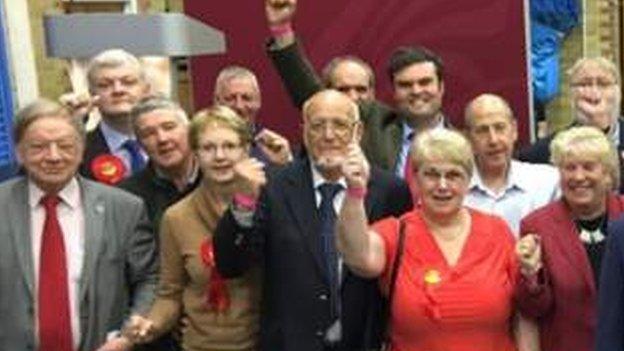Wales council elections: Labour losses 'not as bad as expected'
- Published
- comments
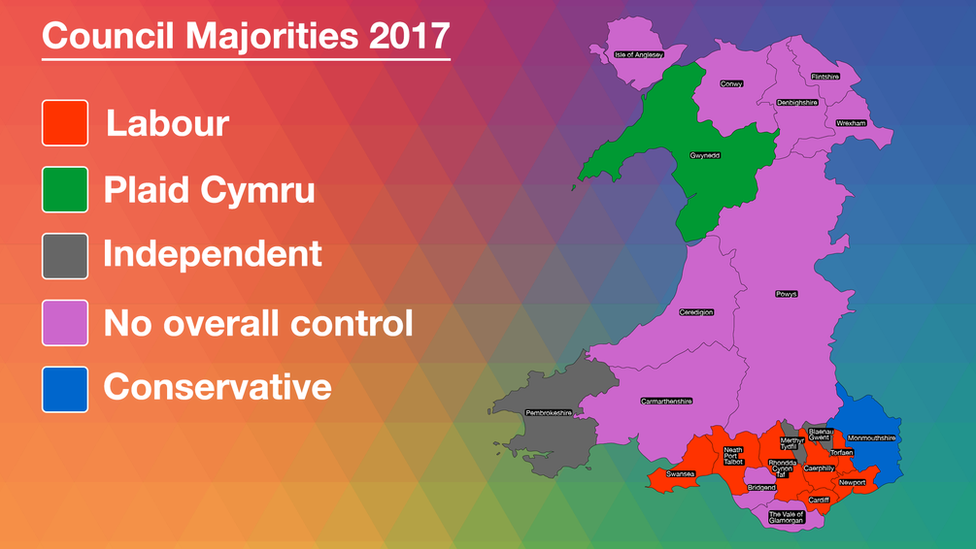
Labour has suffered losses in Wales during the council elections but the Conservatives have failed to make as many gains as expected.
Labour was hit with three major blows after losing control of Blaenau Gwent and Bridgend, as well as its council leader in Merthyr Tydfil.
But it held seven councils including Cardiff, Swansea and Newport.
In Monmouthshire, however, the Tories won control outright and Plaid Cymru kept its majority in Gwynedd.
With all 22 Welsh council results declared:
Labour has clung on to key councils despite inroads from the Tories and Plaid Cymru
10 councils now have no one party in overall control
The Liberal Democrats have failed to make gains
UKIP have not won any seats
The Green Party gained its first Welsh seat of the election in Powys
Independents took many seats across Wales and now control Blaenau Gwent council
Labour has long dominated local government in Wales but its Welsh leader and First Minister Carwyn Jones admitted that it had been a mixed night for the party.
How a Gwynedd seat was decided after a dead heat
He added: "The Tories had been briefing that they'd be walking into power right across Wales this morning - that simply has not happened."
Labour leader Jeremy Corbyn congratulated the Welsh party for "defying the pundits".
But Welsh Conservatives Leader Andrew RT Davies insisted it had been a "good night" for the Tories.
Welsh Conservative leader Andrew RT Davies says the party's hard work has paid off
"We've gained overall control of Monmouth, made huge strides in the Vale of Glamorgan, doubled our representation in Wrexham, and reached double digits right in the backyard of the first minister [in Bridgend]," he said.
Meanwhile, Plaid Cymru leader Leanne Wood said the party had "broken new ground".
But Welsh Liberal Democrats party leader Mark Williams admitted the "process of rebuilding our party will take time".
Gains for the Tories in Wales have been more limited than across the border in England.
The Conservatives had targeted the Vale of Glamorgan but the council remains with no party in overall control, although the Tories are the largest group.
In Denbighshire, they also became the largest party, with 16 seats, overtaking Labour - but no party gained an overall majority.

Plaid Cymru leader Leanne Wood said the party had broken new ground in different parts of Wales

Analysis from Nick Servini, BBC Wales political editor
Labour behind the scenes are delighted but to admit as much would be to reveal how low expectations were approaching this council vote.
"This could have been a lot worse," as one senior figure told me this morning.
That said, to have two of Wales' most economically deprived areas, Blaenau Gwent and Merthyr Tydfil, looking to independents to improve matters at council-level, rather than Labour, is a serious problem.
Welsh Labour can clearly insulate itself from its UK-wide problems at assembly and council election level but the key question is how it can do that in a Westminster campaign.
The Conservatives, and Plaid Cymru, did what it said on the tin; they made gains in places they were expected to without landing any spectacular blows.
They know the general election will be dramatically different in turnout and in the dominance of Brexit as an issue. They will also hope that will make the result very different as well.

For Labour, the loss of overall control in Bridgend will hurt as it is the assembly seat held by Carwyn Jones.
Bridgend had been targeted by the Tories for the general election and Prime Minister Theresa May visited the area recently. They picked up 10 seats on the council, taking their total to 11.
There was better news in Swansea for Labour where the council remains in the party's hands, taking 48 out of the 72 seats.
Labour also held Cardiff, Newport, Rhondda Cynon Taf, Caerphilly, Torfaen and Neath Port Talbot - the latter of which saw Plaid Cymru gain seven seats.
On a good night for the independents, they re-claimed Blaenau Gwent after losing control to Labour five years ago.
Independents won the majority of seats in Pembrokeshire, however, it seems no party will have overall control of the council. Independents are leading in Merthyr, however, three seats have yet to be decided in Cyfarthfa following the death of a candidate. People there will vote on 8 June.
Merthyr independent councillor Kevin O'Neill said: "The words have been used that it's time for change."
The Wales Labour Party's election coordinator Wayne David said the party was stressing its Welsh record
In Gwynedd, Plaid Cymru increased its majority, while in Powys, no party had overall control after independents failed to keep a majority.
There is also no party in overall control in Carmarthenshire but Plaid Cymru, with the largest number of seats, announced it would continue running the council in coalition with independents.
Anglesey remains a council with no party in overall control, although Plaid Cymru overtook independents to be the largest group in the authority.
Conwy will also remain an authority with no party in overall control, with 20 independents holding the most seats.
Flintshire council, which was the first to return all results, had Labour winning the most seats but was short of a majority.
In Wrexham, independents had the most seats but not a majority while Labour's presence on the council has been halved to 11.
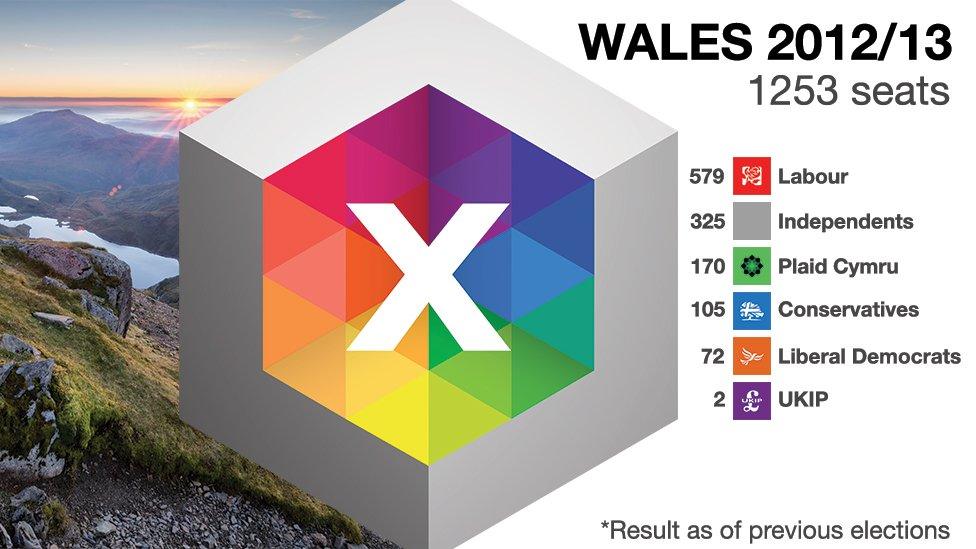
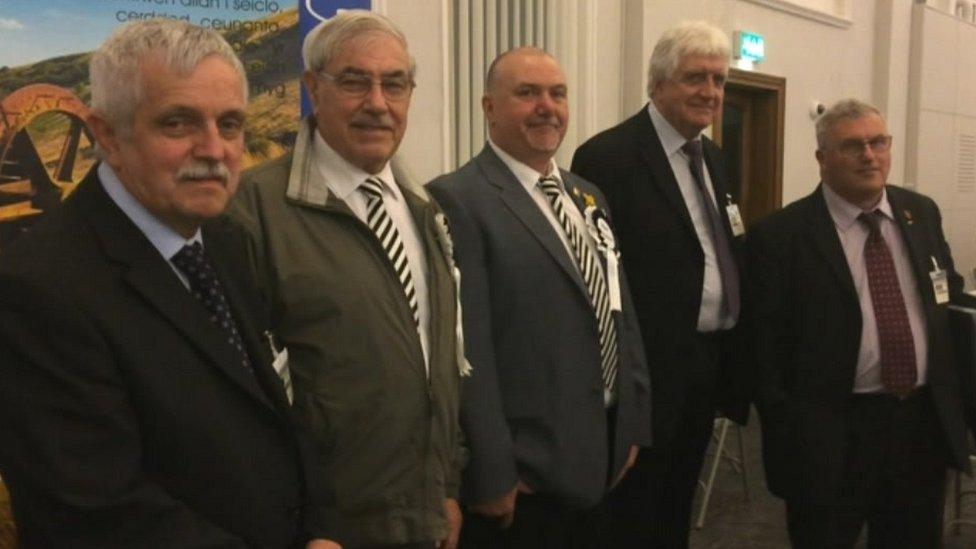
Independent winners in Blaenau Gwent
Labour's Brendan Toomey spoke to BBC Radio 4 about his loss in Merthyr
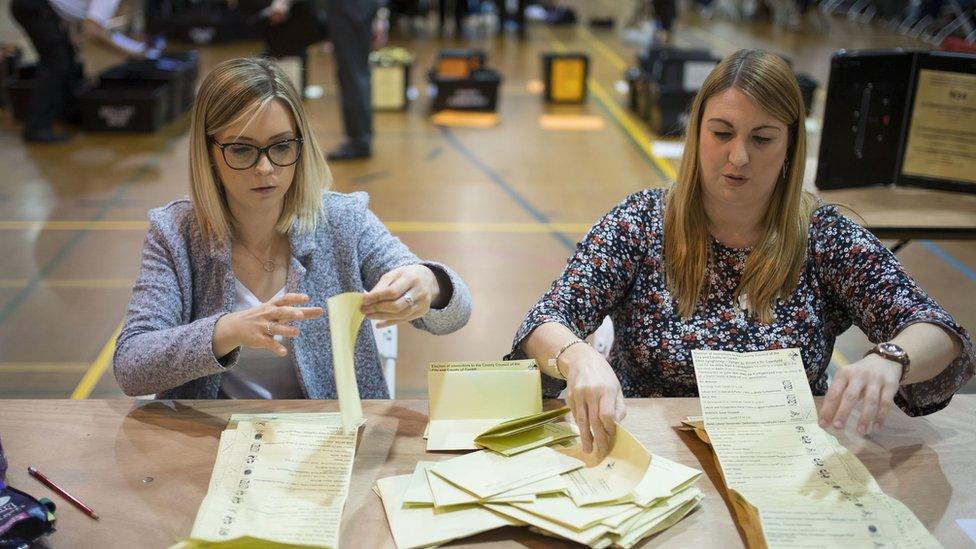
Overnight counts
Merthyr Tydfil - Independents lead Labour (three seat to be declared on 8 June)
Blaenau Gwent - Independents take from Labour
Flintshire - Labour still holds most seats, but no overall control
Wrexham - Independents still hold most seats, but no overall control
Monmouthshire - Conservatives gain full majority
Bridgend - Labour still holds most seats, but loses overall control
Neath Port Talbot - Labour holds
Swansea - Labour holds
Ceredigion - Plaid Cymru hold most seats but no overall control
Torfaen - Labour hold
Newport - Labour hold
Cardiff - Labour hold
Vale of Glamorgan - Conservatives hold most seats but no overall majority
Friday counts
Caerphilly - Labour holds
Denbighshire - Conservatives hold most seats but no overall majority
Conwy - No party in overall control but independents hold most seats
Carmarthenshire - No party in overall control, Plaid Cymru largest party
Rhondda Cynon Taf - Labour holds
Powys - No party in overall control but independents hold most seats
Isle of Anglesey - No party in overall control, Plaid Cymru largest party
Pembrokeshire - Independents hold
Gwynedd - Plaid Cymru holds
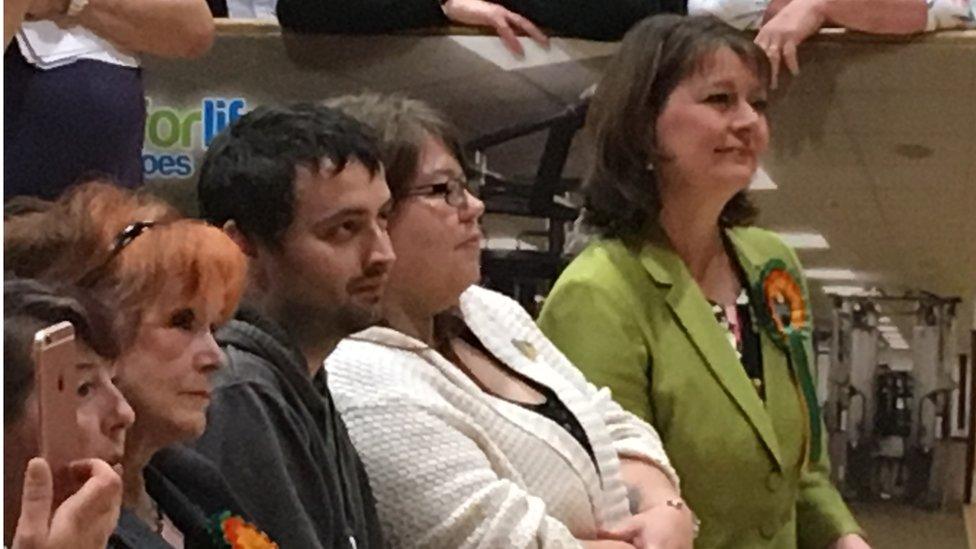
Leanne Wood at the Rhondda count
- Published3 May 2017
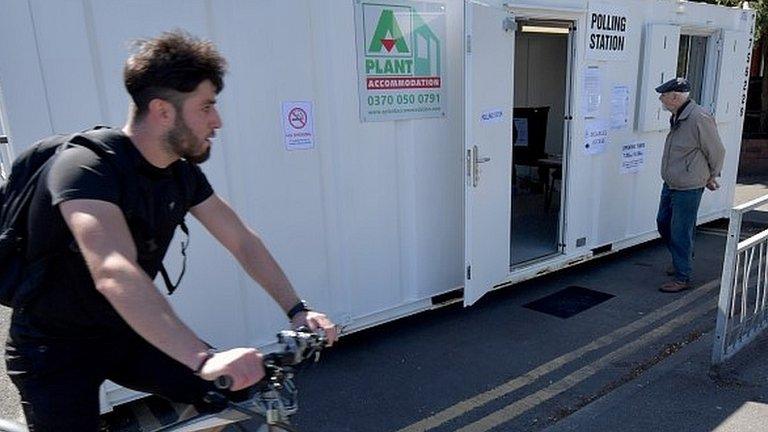
- Published3 May 2017
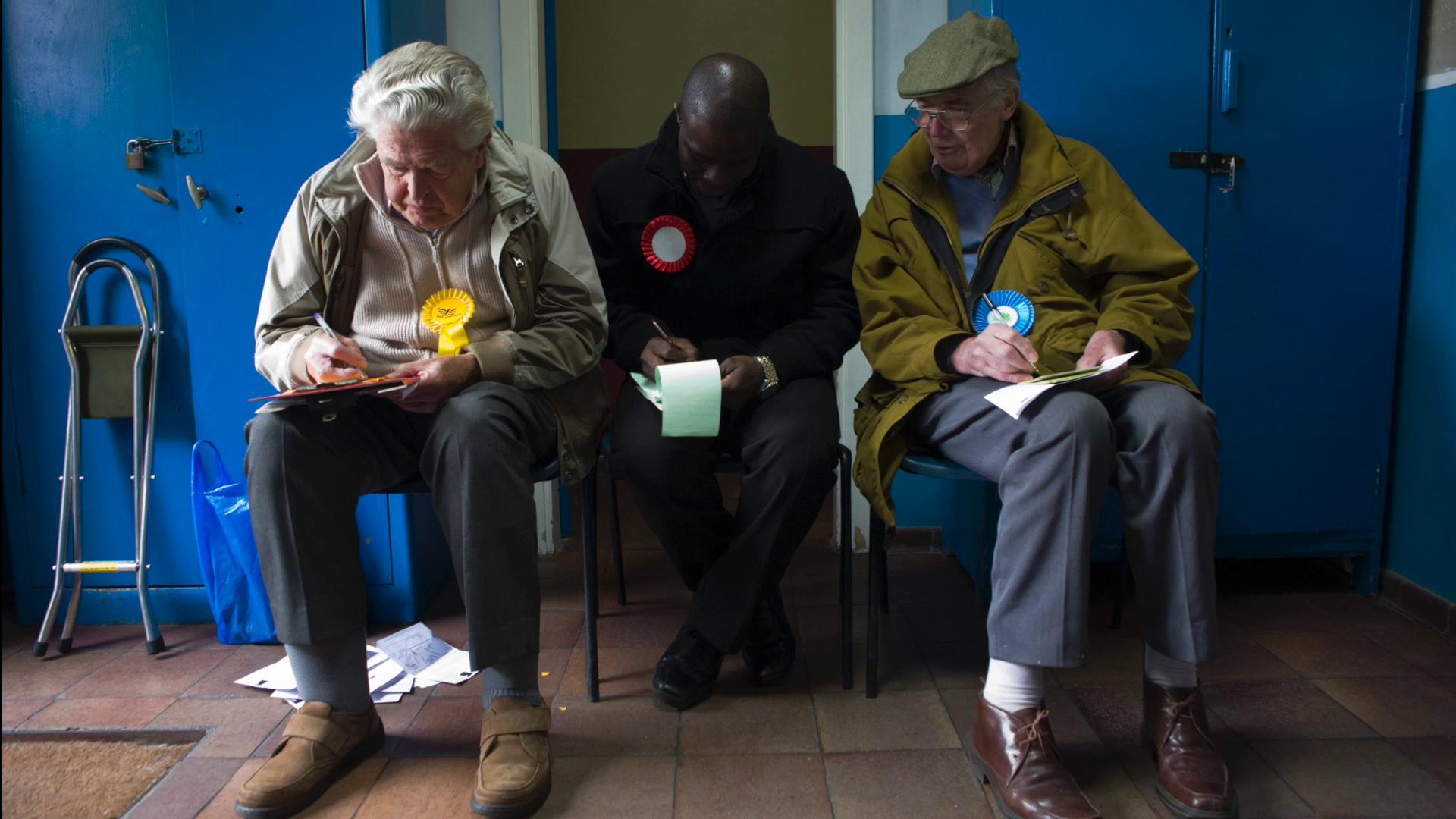
- Published26 April 2017
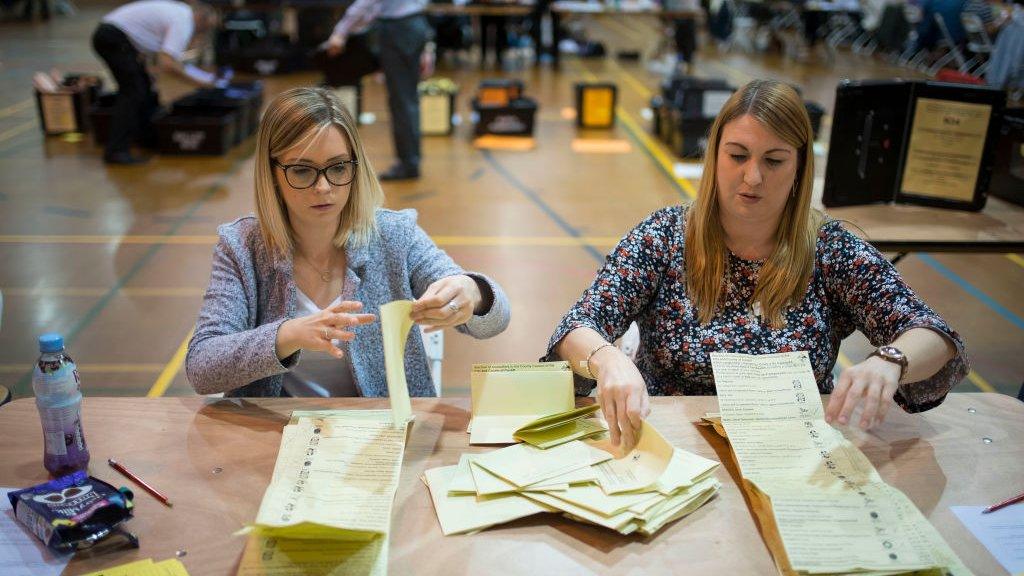
- Published5 May 2017
